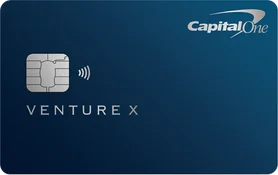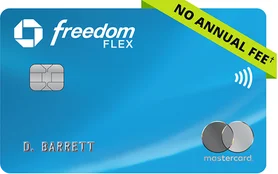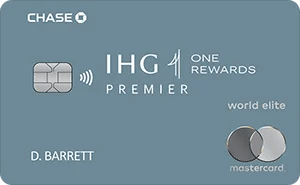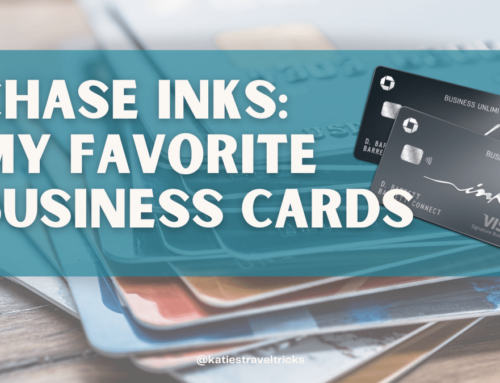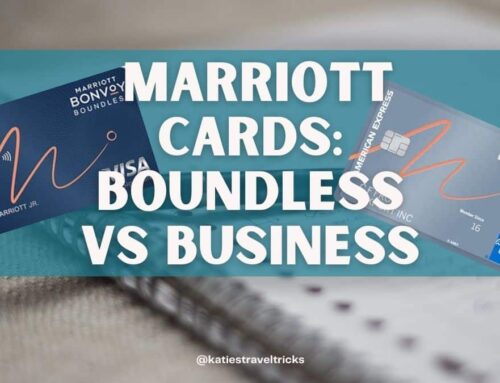Are Credit Card Annual Fees Worth It?
If you’ve never paid an annual fee on a credit card, you may be skeptical of whether it’s really worth it. Your no-fee card may earn you points and have some benefits, like car rental insurance and fraud detection. Why would you need to pay $90+ for a credit card – or, if you’re like us, a stack of cards?
We think annual fees can be worth it, so let’s break down when and why it might be worth paying an annual fee on a card.
First Year
Most travel cards with annual fees are definitely worth the annual fee the first year, if you are eligible for the card’s welcome bonus. Some cards even waive the annual fee the first year!
This doesn’t mean you should open every card, or that you need to keep every card you open. Make sure you understand how opening cards can impact your credit score and your 5/24 status.
Here are just a few examples of travel credit cards and the value you can expect just from the welcome bonus on the card.
| Card Name | Annual Fee | Typical Welcome Bonus | Estimated Minimum Value |
| Chase Sapphire Preferred® | $95 | 60,000 | $750 |
| Capital One Venture Rewards | $95 | 60,000 | $600 |
| Citi Premier Card | $95 | 60,000 | $600 |
| Southwest Rapid Rewards Priority Card | $149 | 50,000 | $650 |
| United Explorer Card | $0 first year, then $95 | 50,000 | $600 |
| IHG Rewards Club Premier Credit Card | $99 | 140,000 | $700 |
After the First Year
Wait until you have had your card for a full year before doing anything. This helps you stay in the good graces of credit card companies and ensure they don’t claw back your points. After a year, assess the ongoing value you anticipate getting from your card and decide whether you want to keep the card.
Before downgrading or canceling the card, call or message customer service to ask for a retention offer. Sometimes credit card companies will offer you a retention offer to get you to keep your card. Retention offers typically come in the form of bonus points or statement credits.
It’s always worth asking for a retention offer before deciding what to do with the card. The key is – you have to ask for it. Not sure what to say? Get our retention offer script here:
If you’ve decided that you don’t want to keep paying the annual fee on your card, and you aren’t satisfied with your retention offer, you have two options:
- Downgrade the card
- Cancel the card
Downgrade the card
Most credit card families have several cards with varying annual fees. Depending on your card, there’s a good chance that you’ll be able to get the bank to downgrade your card to a lower fee or no-fee card.
Here are some examples of popular cards with a fee and a no-fee option you may be able to downgrade to.
| Annual Fee | No Annual Fee |
| Capital One Venture Rewards | Capital One VentureOne Rewards |
| Chase Sapphire Preferred® | Chase Freedom Unlimited |
| Citi Premier | Citi Custom Cash |
| IHG Rewards Club Premier | IHG Rewards Club Traveler |
| Delta Skymiles Gold American Express | Delta Skymiles Blue American Express |
| United Explorer | United Gateway |
Downgrading your card means you will lose the benefits that came with it, but you’ll keep your card history alive and, for flexible rewards cards, you’ll be able to keep your reward points.
Note that you won’t be eligible for any welcome bonuses on the card you downgrade to. For us, this isn’t a big deal since the welcome bonuses on no-fee cards aren’t nearly as generous.
Keeping cards active – by either keeping or downgrading them – is an important part of keeping your credit score high. Closing credit cards could impact your length of credit history and your credit utilization, both of which could have a negative impact on your credit score.
If you have a flexible rewards card, you’re probably earning Citi Premier ThankYou points, Chase Ultimate Rewards, Amex Rewards, or Capital One Venture Rewards. If you close that credit card (for example a Capital One Venture Rewards card) and you don’t have another eligible card (like a Capital One VentureOne Rewards card), any points that you have remaining in your account will be lost. If you downgrade your card to an eligible no-fee card, where available, you’ll be able to keep your rewards.
Note that if you downgrade a flexible rewards card, you may be able to keep the points, but the ways you can use the points may be more limited. For example, if you downgrade a Chase Sapphire Preferred® to a Chase Freedom, you will no longer be able to transfer your Ultimate Rewards to transfer partners and your points will be less valuable when booking through the travel portal.
Cancel the card
There are a lot of reasons you may just want to cancel the card. If you have decided you don’t want to keep or downgrade the card, make sure your points are secure and go ahead and call or message the bank to cancel.
If it is airline or hotel card, your points have already been transferred to that hotel or airline loyalty account so cancelling your card will not affect your points. If it is a card that earns bank points, you will need to use or transfer your points before you cancel.
Card Benefits
Whether or not a card’s benefits outweigh the annual fee after that first year varies from person to person. If you are paying for a card but not using the card or taking advantage of its benefits, it’s probably not worth having.
If you travel, there’s a good chance that there’s a card (or a few) out there with an annual fee that will pay for itself and that will be worth not just opening, but keeping year after year.
Many cards come with benefits like trip delay and trip interruption insurance, lost baggage reimbursement, primary car rental insurance, extended warranty protection, and cell phone protection. If you find value in these insurances and protections, that alone may be worth an annual fee.
In addition, other cards come with statement credits and yearly bonuses or freebies that equal more than the annual fee of the card.
Check out Katie’s YouTube video and keep reading to learn about some of our favorite credit cards with annual fees that we think pay for themselves!
Examples of Cards Worth Keeping
Capital One Venture X
You can read all about the Capital One Venture X card here. The Venture X is a flexible rewards card, meaning that you will earn miles that can be redeemed in a few ways.
You typically get the best value for your miles by transferring them to a Capital One transfer partner, but you can keep it simple by using your miles to book travel through the Capital One Travel Portal or erasing travel purchases from your statement.
This is our family’s “everyday spend” card – if we aren’t trying to meet a credit card minimum spend or get bonus points on another card, we use our Venture X. The $395 dollar fee seems steep at first glance, but you can see that you are getting more than $395 worth of value from this card. And that’s before accounting for other perks, detailed here.
| Benefit | Estimated Value |
| Annual Travel Credit | $300/year |
| 10k points each account anniversary | $100/year |
| Global Entry/TSA PreCheck statement credit | Up to $100 every 4 years |
| Lounge Access for your whole family | Priceless |
credit card
welcome offer:
75,000 miles
Earn 75,000 bonus miles when you spend $4,000 on purchases in the first 3 months from account opening, equal to $750 in travel
Annual Fee:
$395
Southwest Rapid Rewards Priority Card
Southwest is a great airline for families – offering free checked bags, family boarding, snacks on board, flexible change policies, and great customer service.
We love that Southwest card bonuses can make a Companion Pass (for up to two years!) achievable. Read all about how to use bonuses to earn a Companion Pass here.
If earning a Companion Pass isn’t enough of a reason to splurge on paying an annual fee for a Southwest card, the $149 fee on the Priority Card pays for itself.
| Benefit | Estimated Value |
| Southwest travel credit | $75/year |
| 7.5k points each account anniversary | $97.50/year |
| 4 Upgraded Boardings | $120/year |
Chase Sapphire Preferred®
The Chase Sapphire Preferred® is one of our favorite cards to start with. But it’s also a great card to keep long term. Or at least for 48 months until you are able to cancel it and qualify for a new welcome bonus.
The points can be redeemed through the travel portal but our favorite use is transferring them to Hyatt. You can book stays in Hawaii, all-inclusive resorts, and more.
Pairing it with a no-annual-fee Chase Freedom Flex can offer some even greater potential. That’s because it is easier to earn points on a Freedom Flex. Officially the Freedom Flex earns cash back BUT this is actually awarded in Ultimate Rewards that can only be redeemed for cash back. When you have a Freedom and a Sapphire — Chase gives you the opportunity to combine your points into one card account. So the $200 cash back you earned on a Freedom card becomes 20,000 Ultimate Rewards points.
The Chase Freedom Flex has quarterly bonuses — different categories where you can earn 5 points per dollar each quarter (up to $1,500). If you max these out, you will earn 7,500 Ultimate Rewards points per quarter or 30,000 per year. Even better: the current bonus on the Freedom Flex also offers 5 points per dollar on grocery store purchases (up to $12,000) in the first year. If you max out the grocery bonus, you can earn 60,000 points!
| Benefit | Estimated Value |
| $50 Credit for hotels booked through Chase Travel portal | $50 |
| $15 Instacart credit every quarter | $60 |
credit card
welcome offer:
$200 Bonus Cash Back
Learn How to Apply – Earn $200 bonus cash back after you spend $500 on purchases in your first 3 months from account opening.
Annual Fee:
$0
IHG Rewards Premier/Premier Business Cards
You can read about the three IHG (Intercontinental Hotel Group) cards and all their benefits here. With an annual fee of $99, the benefits of the IHG Rewards Premier and Premier Business cards can far surpass the fee.
The annual anniversary night is worth a minimum of $200, but if you find the right deal, it can exceed $1,000 in value. For example, for an upcoming night in Florence, Katie booked a $1500 night suite at Villa Cora using a Free Night Award + 17,000 points.
| Benefit | Estimated Value |
| Reward night (up to 40k points) each account anniversary | $200+ |
| Global Entry/TSA PreCheck statement credit | Up to $100 every 4 years |
| United Airlines TravelBank Cash | $50/year |
Current Bonus:
140,000 points
Earn 140,000 bonus points after spending $3,000 on purchases in the first 3 months from account opening.
Annual Fee:
$99
credit card
Current Bonus:
175,000 points
New Limited Time offer! Earn up to 175,000 Bonus Points. Earn 140,000 Bonus Points after spending $4,000 on purchases in the first 3 months from account opening. Plus, earn 35,000 Bonus Points after spending a total of $7,000 in the first 6 months from account opening.
Annual Fee:
$99
Table of Contents
Table of Contents
Responses are not provided or commissioned by the bank advertiser. Responses have not been reviewed, approved or otherwise endorsed by the bank advertiser. It is not the bank advertiser’s responsibility to ensure all posts and/or questions are answered.


